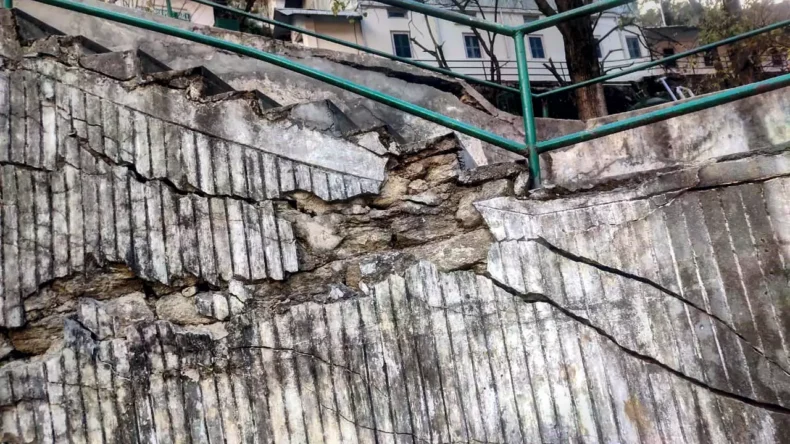A temple collapsed in the Himalayan town of Joshimath, Uttarakhand on Friday evening.
The fall had caused fissures in about 600 homes due to soil movement, leading to few residents camping out in the cold. Residents blame the fissures for the sheer construction of bigger projects.
Pushkar Singh Dhami, the Chief Minister of Uttarakhand, has directed that all affected households be evacuated to temporary shelters. He is also scheduled to pay them a visit on Saturday.
The construction of tunnels for hydel power plants, according to the locals, is what caused these fissures. To develop bypasses and widen roadways, one must continuously drill through rocks during construction. As a result of their concern that their homes might collapse at any moment, many locals have decided to stay in hotels or camps.
The government ought to have taken the lead in looking into these issues years ago as this phenomenon is not brand-new. These problems have grown so large as a result of the government’s decision to disregard them.

THOSE INJURED

The Municipality Chief estimates that the fissures have had an impact on more than 3,000 persons (about 10% of the population). The temple was abandoned when it developed significant cracks, therefore no one has been hurt inside.
The afflicted have been requested to leave their homes, and the state government has provided all people impacted by the collapse Rs 4,000 per month for the next six months. They receive this funding from the Chief Minister’s Relief Fund.
THE REASON BEHIND THE CRACKS

In the holy town, cracks appear to run along the roads and grow wider. According to reports, the town serves as a gateway for Hindu and Sikh pilgrimages and is home to one of the largest military installations close to India’s border with India.
A team of experts has been stationed in the Himalayan town to conduct a door-to-door study. To comfort the villagers, the Uttarakhand Government also assembled a team of scientists last Thursday to check into the issue of the sinking ground and the looming fissures along the dwellings. The crew promised the residents they would investigate the situation.
ABOUT JOSHIMATH

In the eighth century, Adi Shankaracharya is supposed to have attained enlightenment in Joshimath, a spiritual village in Uttarakhand.
With the closure of the largest ropeway in Asia, hotels closing their doors for an indeterminate period, and citizens taking to the streets, these recurrent incidents of fissures throughout the town have resulted in a reduction in tourism in the state.
Only because of the town’s geographic location is it prone to fissions. The gneissic rocks were completely worn away, had a low cohesive value during monsoon season, and have a tendency for high pore pressure when saturated with water, according to experts from the Wadia Institute of Himalayan Geology who conducted a survey in the year 2022. According to experts who have looked into the situation, a large part of this is because the city was constructed on landslide debris, and because of this debris, it cannot withstand the quick rate of construction. Due to the rising number of structures, hydropower developments, and the extension of the National Highway, the slopes end up becoming very unstable.













